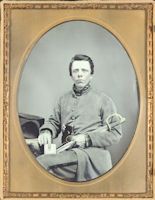27th May (Wednesday).—Arrived at Montgomery, the capital of Alabama, at daylight, and left it by another railroad at 5.30 A.M.
All State capitals appear to resemble one another, and look like bits cut off from great cities. One or two streets have a good deal of pretension about them; and the inevitable “Capitol,” with its dome, forms the principal feature. A sentry stands at the door of each railway car, who examines the papers of every passenger with great strictness, and even after that inspection the same ceremony is performed by an officer of the provost-marshal’s department, who accompanies every train.[1] The officers and soldiers on this duty are very civil and courteous, and after getting over their astonishment at finding that I am a British officer, they do all they can to make me comfortable. They ask all sorts of curious questions about the British army, and often express a strong wish to see one of our regiments fight. They can hardly believe that the Coldstream is really dressed in scarlet. To-day they entered gravely into a discussion amongst themselves, as to whether British troops would have taken the position at Fredericksburg. The arguments on both sides were very amusing, and opinion was pretty evenly divided. We met three trains crammed full of soldiers for Johnston’s army. They belonged to Breckenridge’s division of Bragg’s army, and all seemed in the highest spirits, cheering and yelling like demons. In the cars to-day I fell in with the Federal doctor who was refused leave to pass through General Johnston’s lines; he was now en route for Richmond. He was in full Yankee uniform, but was treated with civility by all the Confederate soldiers. I had a long talk with him; he seemed a sensible man, and did not attempt to deny the universal enthusiasm and determination of the Southerners. He told me that General Grant had been very nearly killed at the taking of Jackson. He thought the war would probably terminate by a blow-up in the North[2]
I had to change cars at West Point and at Atlanta! At the latter place I was crammed into a desperately crowded train for Chattanooga. This country, Georgia, is much more inhabited and cultivated than Alabama. I travelled again all night.
[1] This rigid inspection is necessary to arrest spies, and prevent straggling and absence without leave.
[2] Notwithstanding the exasperation with which every Southerner speaks of a Yankee, and all the talk about black flag and no quarter, yet I never saw a Federal prisoner ill treated or insulted in any way, although I have travelled hundreds of miles in their company.










